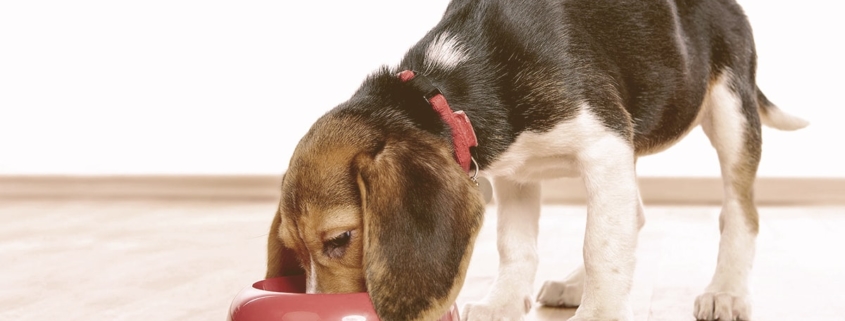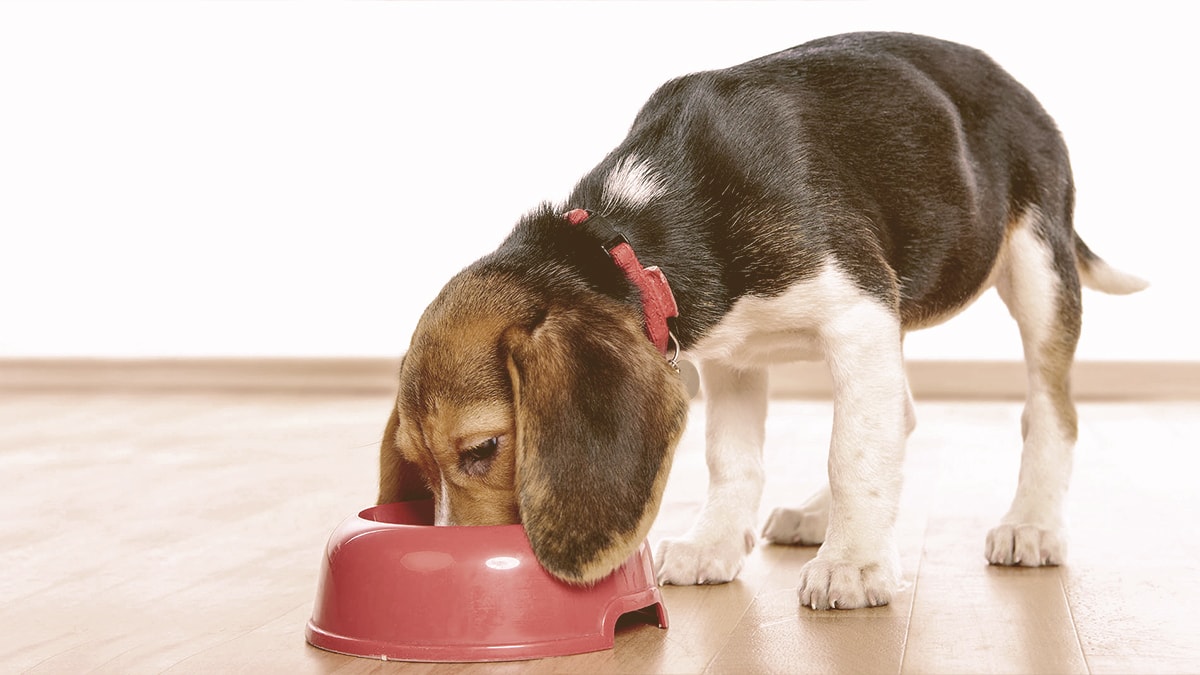
A Guide to Adding Fat to Your Dog’s Diet
Alex Vicente • Updated on August 1, 2023
- This review contains affiliate links. Read more here.
- Not a substitute for professional veterinary help.
Many dog owners understand that a dog must have a consistent source of good fats to maintain a healthy diet.
This is because a wild dog would eat a diet consisting of protein and fats including all organ meats, blood, skin, and bones, making a balanced meal.
A dog would never eat carbohydrates or a lean protein diet that includes only vegetable oils.
These two diets are responsible for the canine obesity epidemic that is seen today.
To add healthy fats to your dog’s diet, feed a varied array of fats and oils to fuel healthy energy, growth, coat, organs, brain, and muscles.
Sources of these fats include salmon, herring, sardines, meat, poultry, coconut oil, raw butter, eggs, and oils such as flax, hempseed, walnut, and olive.
Dogs do not metabolize carbohydrates for energy.
Instead, they naturally use protein to build muscle, and they burn fats for energy.
Without adequate fat intake, dogs will use protein as a source of energy, depriving their muscles and organs.
Moderation is key to increasing your dog’s healthy fat intake.
Read on to better understand what healthy fat ingredients are, what makes them healthy for your dog, and how to implement them.
ALSO READ: Best Dog Food for Small Senior Dogs
Table of Contents
Feeding Dogs Table Scraps and Drippings

This is the most common source of supplemental fat for household dogs and it is the most common cause of supplemental feeding obesity. Feeding your dog table scraps and drippings is not considered healthy and does not provide necessary dietary fats for several reasons.
- If your meat scraps are cooked with ingredients like onions, garlic, or leeks, then they can make your dog very sick.
- Table scrap meats can be full of preservatives and artificial seasonings that are just as detrimental to your pet’s health as they are to yours.
- The fat content of table scraps is often very low because the cooking process has taken most of the fat and oil out of the meat. This makes it a high protein and low-fat source of food, similar to mass-market kibble.
- Bones that have been cooked should never be fed to dogs. They will splinter and can cause major damage to the mouth, esophagus, stomach, and intestines—if they make it that far without needing surgical intervention.
Acceptable Table Scraps
There are a few table scraps that can be very good for dogs. This is because the food that you are cooking is clean and healthy, and you are cooking it with the secondary purpose of feeding some to your dog.
- Unseasoned meats that are made without hormones or preservatives.
- Raw meaty bones that are large enough that the dog can not get the entire bone into its mouth — This helps protect the dog from choking. These should be refrigerated if the dog does not eat it all in one sitting and then discarded after two to three days.
- Cooked poultry skin that is taken from hormone-free pastured chickens — This skin is full of vitamins and fats such as collagen that are vital for a healthy coat, skin, joints, and muscles. As with any fat, only give in small amounts. Never give large amounts of fat to dogs that are prone to pancreatitis.
- Eggs that are raw, or cooked without spices or seasonings.
- Bacon that is nitrate- and nitrite-free.
- Drippings from meats that are cooked without garlic, onions, spices, or preservatives — These drippings can be added as seasoning to other foods for the dog. They will enrich leaner proteins and give a nutrition boost as well.
Most meat drippings that you use will contain higher levels of omega-6 fatty acids. This is not necessarily bad, but this omega-6 intake should be balanced out with sources of omega-3 fatty acids. It is very easy to eat high levels of omega-6 fatty acids due to the nature of the typical western diet. It requires a little more effort to include more anti-inflammatory omega-3 fatty acids.
ALSO READ: Best Dog Bowl Material
Give Your Dog Fatty Sardines in the Can
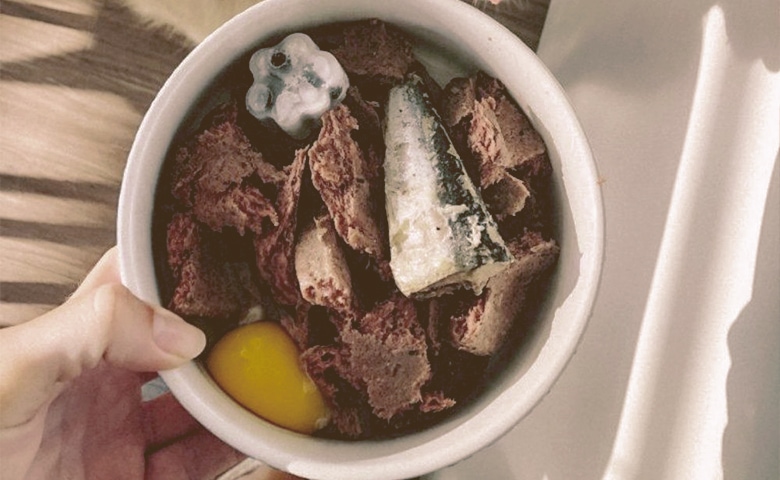
Sardines are specifically recommended because they are high in two types of omega-3 acids: DHA and EPA, but unlike regular fish oil supplements, they are also high in iodine. Dogs that are deficient in iodine may be cold all the time, overweight, tired, and very thirsty.
- Feed only about a quarter of a 3.75 ounce can of sardines at a time. This amount of sardines can be added to a beef or poultry meal to increase omega-3 and iodine intake at once.
- Use sardines that are preserved only in oil or water. Do not use sardines that are packed with seasonings or sauces of any kind.
- Sardines are the freshest source of omega-3 oils. Fish oils may go rancid or be contaminated with heavy metals, BHA, traces of radioactive minerals, or mercury. Sardines and phytoplankton sources of omega-3 are usually free of these dangerous contaminants.
In nature, a dog’s diet would include natural sources of iodine. Because iodine can be overdosed with drops and supplements, use only natural sources of iodine such as sardines or phytoplankton.
Are Eggs High in Fat for Dogs?
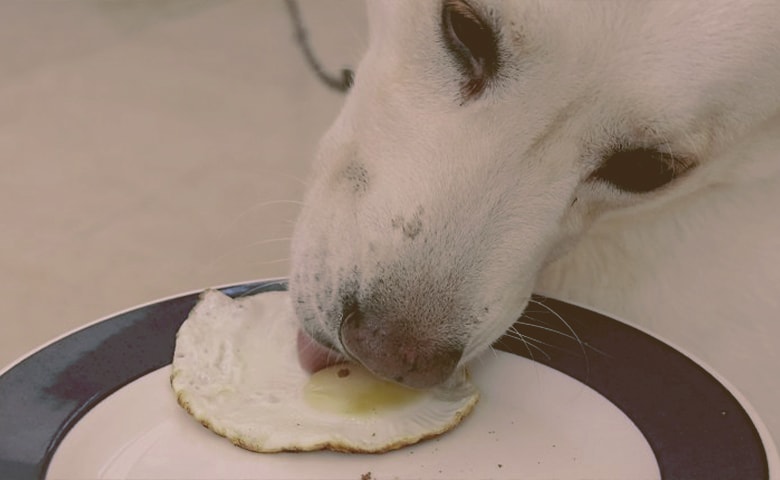
Eggs are an excellent source of many vitamins and trace minerals. They are also one of the most readily available sources of complete protein and omega fatty acids. If you can buy free-range organic eggs, those are even better. Omega-3 eggs have been shown to be higher in anti-inflammatory omega-3 fatty acids than regular eggs.
- Eggs contain an omega-6 fat called Arachidonic Acid (AA). This is a brain-food fatty acid. Puppies who do not get enough AA in their diet will grow up to be dogs that people might consider “dumb.” This is because their brain was not fed enough healthy fatty acids to develop to full potential.
- Most vets recommend feeding cooked eggs to your dog. This is because dogs are also susceptible to salmonella that may be present in raw eggs, just like humans are. This can result in vomiting, diarrhea, fever, and fatigue.
- If you choose to feed raw eggs to your dog, be sure they are from a safe source and watch for signs of illness.
- Dogs can eat clean eggshells, but be aware that the shells are sharp and may cut the dog’s mouth. You can grind them up into the food if you wish. They are an excellent source of calcium, but certainly not the only source of calcium available to dogs.
- One egg per day is recommended as a healthy intake by the AKC.
You can feed your dog cooked eggs in any way you like. Poached, scrambled, hard-boiled, or fried. If you use fat to fry an egg, choose a healthy fat that will not oxidize with cooking, such as raw pastured butter.
ALSO READ: Dog Not Drinking Water, What Can I Do?
Boost Dog’s Fat Intake with Salmon Skin
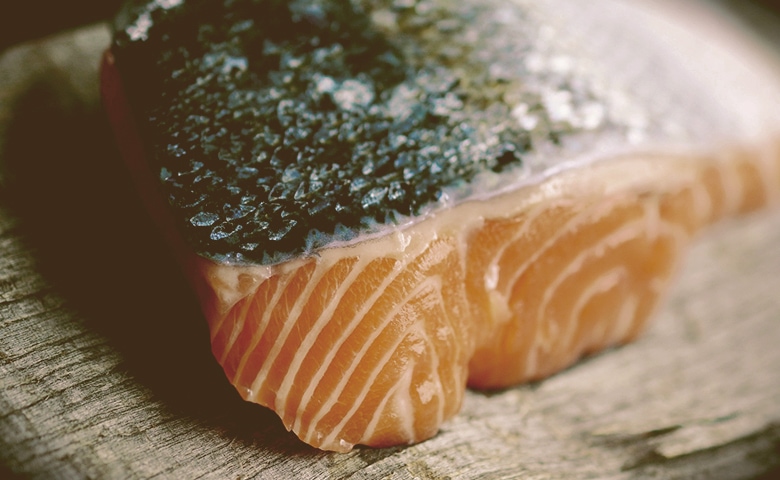
Salmon can be fed to the dog as long as it is cooked well and deboned. A dog will choke on salmon bones, so be very careful to remove all bones. Salmon is an excellent choice for increasing a dog’s fat intake. It is full of healthy anti-inflammatory omega fatty acids, trace minerals, and healthy vitamins.
- Salmon contains a fatty acid called Eicosapentaenoic Acid (EPA) which is found in oily fish. EPA is a powerful depression fighter, even in animals. If your dog seems lethargic and depressed, try increasing his intake of fatty fish to increase the level of EPA in the brain.
- Never feed a dog raw salmon. It can contain parasites that invade the dog’s small intestine causing hemorrhaging and death.
- Canned or pouch salmon can be fed to dogs safely. Be sure it is free of bones before you feed it to the dog. Bones in canned salmon are usually soft enough to eat, but you may want to pick them out to be safe.
- Salmon skin is great for your dog if it is cooked thoroughly to kill parasites. Salmon skin has the greatest concentration of omega-3 fatty acids in the entire fish.
- Never feed smoked or chemically preserved salmon or salmon skin to your dog. These products contain ingredients that are harmful to the dog’s health.
Wild Alaskan salmon is considered to be the safest source of salmon. This salmon is wild-caught from the Alaskan fishery, in waters that are cleaner than anywhere else. This means that both the skin and the meat of your salmon are less likely to contain mercury, radioactive traces, PCBs, and other pollutants.
Use Flaxseed Oil to Increase Dog’s Fat
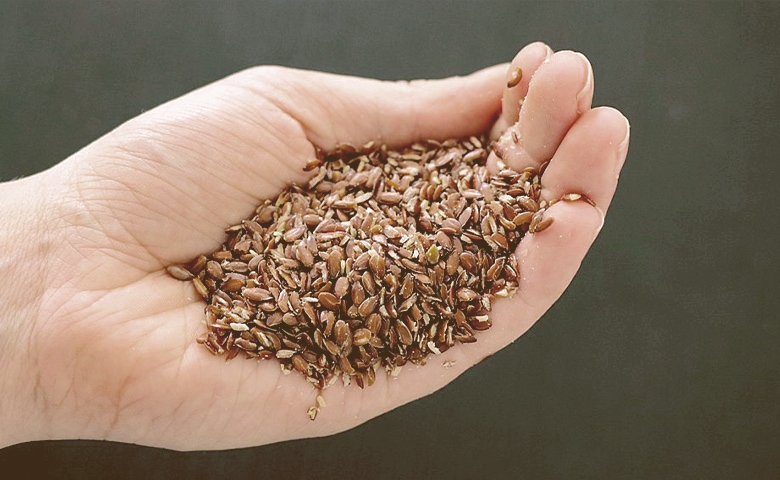
There are a variety of seed oils that you can use to supplement your dog’s diet. Whether you are feeding a kibble diet or a raw meat diet, your dog will need supplementation to get enough healthy fats on a regular basis. You can add various nutritious seed oils to lean meats and kibbles to help boost nutrition content for your dog.
Flaxseed oil is commonly advised as a good source of ALA. A healthy dog’s metabolism will break down into the EPA and DHA that it needs for a healthy coat and skin. If your dog is being fed a grain-based kibble diet, then flaxseed oil should be avoided because the grains are already very high in ALA.
- Flaxseed oil should be a secondary consideration if fish oils can not be used in the dog’s diet. This is because flaxseed oil is less bioavailable for dogs.
- It is possible to overdose on flaxseed oil because it contains cyanide. The risk of poisoning is very low unless flax seeds are taken in copious amounts. Ask your vet or consult a dosing table such as this one from Your Old Dog to determine how much flaxseed oil your dog should receive daily.
- If your dog begins to appear to have dandruff, itchy skin, or other signs of allergy, then stop administering flaxseed oil.
- Flax spoils very quickly. Note the date you open a new bottle and write the expiration date on the bottle so you do not risk giving your dog rancid oil.
Flax seeds can be ground fresh daily in a dedicated coffee grinder and given to the dog. Be careful to not use a grinder that is also used for coffee. Coffee is toxic for dogs, and double-duty use of the grinder increases the risk of cross-contamination.
Coconut Oil as Dog’s Dietary Fat
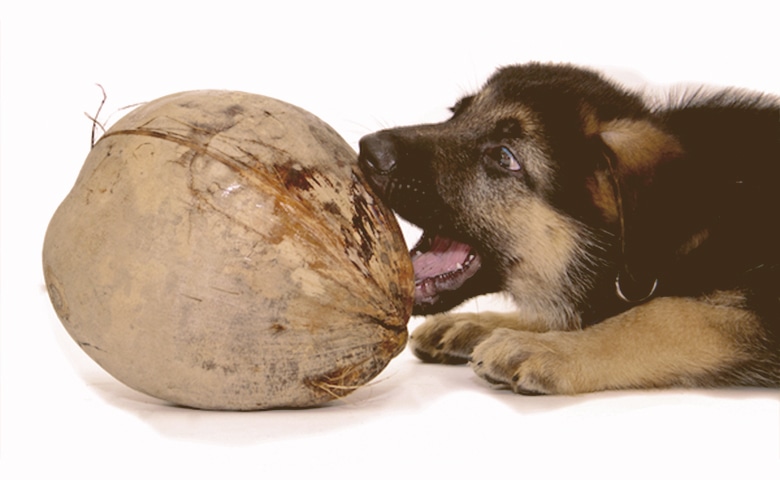
People love their coconut oil, and many people love to share it with their dogs. People consume large amounts of coconut oil because it feeds the brain cells, rejuvenates skin, helps to shed excess weight, and gives energy. It is believed by many that dogs can receive these same benefits from small amounts of coconut oil supplementation.
Always begin supplementing oils slowly. Failure to gradually step up dosing will likely result in diarrhea for your dog. Secondly, breeds that are prone to pancreatitis should be given smaller amounts of supplementary oils or none at all.
- Coconut oil is almost completely saturated fats, and most of those saturated fats are medium-chain triglycerides (MCT). These fats rev up the metabolism and provide a source of healthy energy. Dogs benefit from this energy boost as well. This type of energy is exactly right for a dog’s DNA.
- Coconut oil contains lauric acid which is antibacterial, antifungal, and antiviral. This means that both you and your dog can get a nice immune boost from the consumption of coconut oil and MCT oil.
- MCT oils also boost brain health and function. This can help keep your old dog thinking and acting younger for much longer.
Vets and the AKC caution that there are not enough studies that have produced evidence that coconut oil is actually beneficial for dogs. Furthermore, coconut oil does not contain enough omega-3 and omega-6 fatty acids to be the sole source of supplementation for your dog. It is not confirmed that the dog’s digestive system is able to efficiently break down coconut oil, but it is also believed to be safe.
Add Fat to Dog’s Diet with Hemp Seed Oil
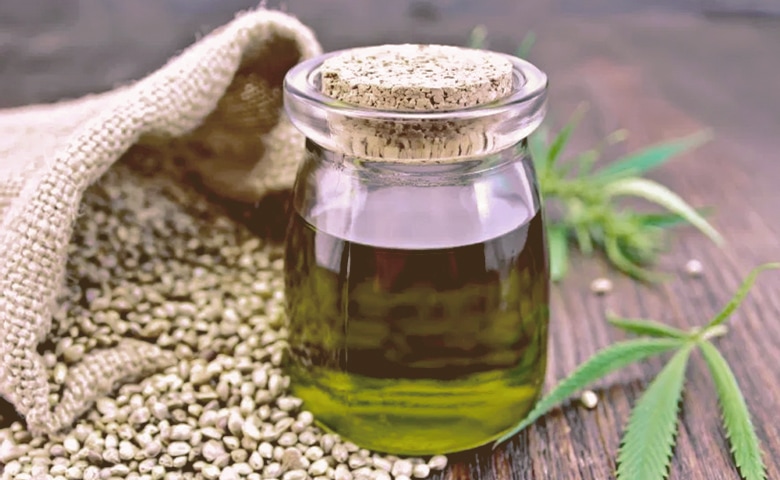
There are two kinds of hemp oil that you can buy. One is called hemp seed oil, and the other is hemp oil. Hemp seed oil is pressed from hemp seeds, just like flaxseed oil is pressed from flax seeds. Hemp oil is taken from the whole plant. Both kinds of hemp oil are also separate from CBD oil. This recommendation is only concerning hemp seed oil.
Hemp seed oil is gaining in popularity due to the rich omega fatty acid content. More dog owners are sharing their love of hemp seed oil with their dogs in hopes that the dog will reap the many benefits. Hemp seed is a frequently recommended oil-based on anecdotal evidence of efficacy.
- Hemp seed oil is high in linoleic acid (LA), alpha-linolenic acid (ALA), and gamma-linoleic acid (GLA).
- Hemp seed oil contains the perfect ratio of omega-3 fatty acids to omega-6 fatty acids.
- Humans take hemp seed oil to improve heart health, blood pressure, and relieve dermatitis.
- Hemp seed oil has been shown to reduce overall cholesterol levels and specifically the LDL cholesterol level.
People give hemp seed oil to their dogs on the assumption that these proven benefits in humans are transferable to their canine companions. However, aside from anecdotal evidence, there have not been any studies proving that hemp seed oil gives dogs these same benefits. There have been studies showing some risks of whole-plant hemp oil and CBD oil for dogs, but there do not appear to be any risks concerning hemp seed oil.
Chia Seeds to Increase Dog’s Fat Intake

Another anecdotally beneficial source of healthy fats is chia seeds. These tiny seeds are superfood powerhouses. It is assumed that dogs receive the same incredible health benefits from the consumption of chia seeds that humans do.
- Chia seeds have little to no taste, so they can be ground up and sprinkled into your dog’s food pretty much undetected.
- Chia seeds can be soaked to create a nutritious gel that can be added to wet foods. Make this gel by soaking chia seeds in water at a ratio of 1:10. This gel can also be made with ground chia seeds.
- They are an incredibly rich source of omega-3 fatty acids, namely ALA.
- Chia seeds are super high in fiber which promotes healthy digestion and good intestinal health.
- These seeds also promote heart health, help to regulate blood pressure, support thyroid function, and feed the brain.
- Chia seeds contain a high amount of manganese. Manganese is an important trace mineral that enables dogs to metabolize omega fatty acids such as ALA into usable fatty acids such as EPA and DHA. Manganese also supports reproduction, carbohydrate digestion, and proper skeletal development.
Chia seeds are very tiny, and it may be tempting to just put a sprinkle of chia seeds on your dog’s food. However, this will probably end with you finding lots of little chia seeds in your dog’s stool later. As with flax seeds, the chia seeds should be prepared for digestion and absorption.
Conclusion
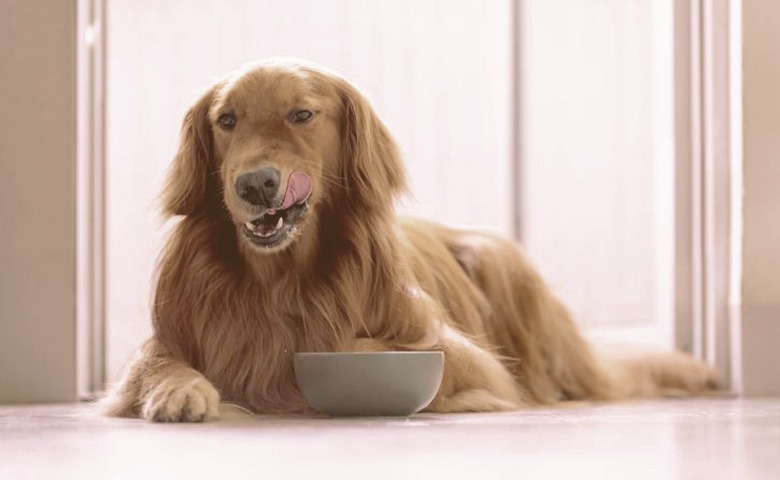
While it is true that various seeds and seed oils can be used to supplement a dog’s diet with healthy fats, especially omega-3 and omega-6 fatty acids, many of these plant-based oils have not been proven to be particularly efficacious for canine metabolism. However, many anecdotal accounts demonstrate improved health for dogs who consume these plant-based fats.
The best sources of fats for your dog are from ones that he would naturally find in the wild. These include fats from whole-carcass sources that include skin and organs. The easiest way to supplement your dog’s healthy fat intake is by feeding sardines, cooked fish such as salmon including the cooked skin, and cooked eggs. These sources are known to be bioavailable for canines and are naturally and easily digested by dogs.
Sources
cbs news
Pet Coach
Britannica
Webmd
Keep the Tail Wagging
akc
Dogs Naturally Magazine
akc
Your Old Dog
Healthline
Dog Health Coach
akc
Global Healing
Draxe
Draxe
Dr Basko
Dogs Naturally Magazine
Healthline
PetMD
Dogs Naturally Magazine

